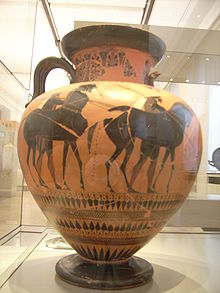Acamante
In Greek mythology, Acamante or Acamas (in ancient Greek Ἀκάμας Akámas) is a son of Theseus and Phaedra, and brother of Demophon.
Before the Greek expedition against Troy, he and Diomedes were sent to demand the surrender of Helen (in the Iliad, Menelaus and Odysseus are said to have formed that embassy), but during During his stay in the city, Acamante won the affection of Laodice, daughter of Priam, from whom he had a son, Múnitus, who was raised by Etra, Acamante's grandmother. Virgil names Acamante among the Greeks who locked themselves up on the Trojan Horse to take the city. Acamante received the captive Clymene as part of the spoils of war. During his return to Greece he was arrested in Thrace by his love Philis, but later he left this country and arrived at the island of Cyprus, where he died falling from his horse onto his own sword. However, in other versions this legend is the death not of Acamante but of his brother Demophon.
The mountain of Acamas on the island of Cyprus, the city of Acamantio in Phrygia, and a tribe from Athens: the Acamantids receive their names from him. He was painted in the Delphi painting by Polygnotus, and there was also a statue of him in the city.
Contenido relacionado
Hercules (disambiguation)
Neopaganism
Moor (mythology)
